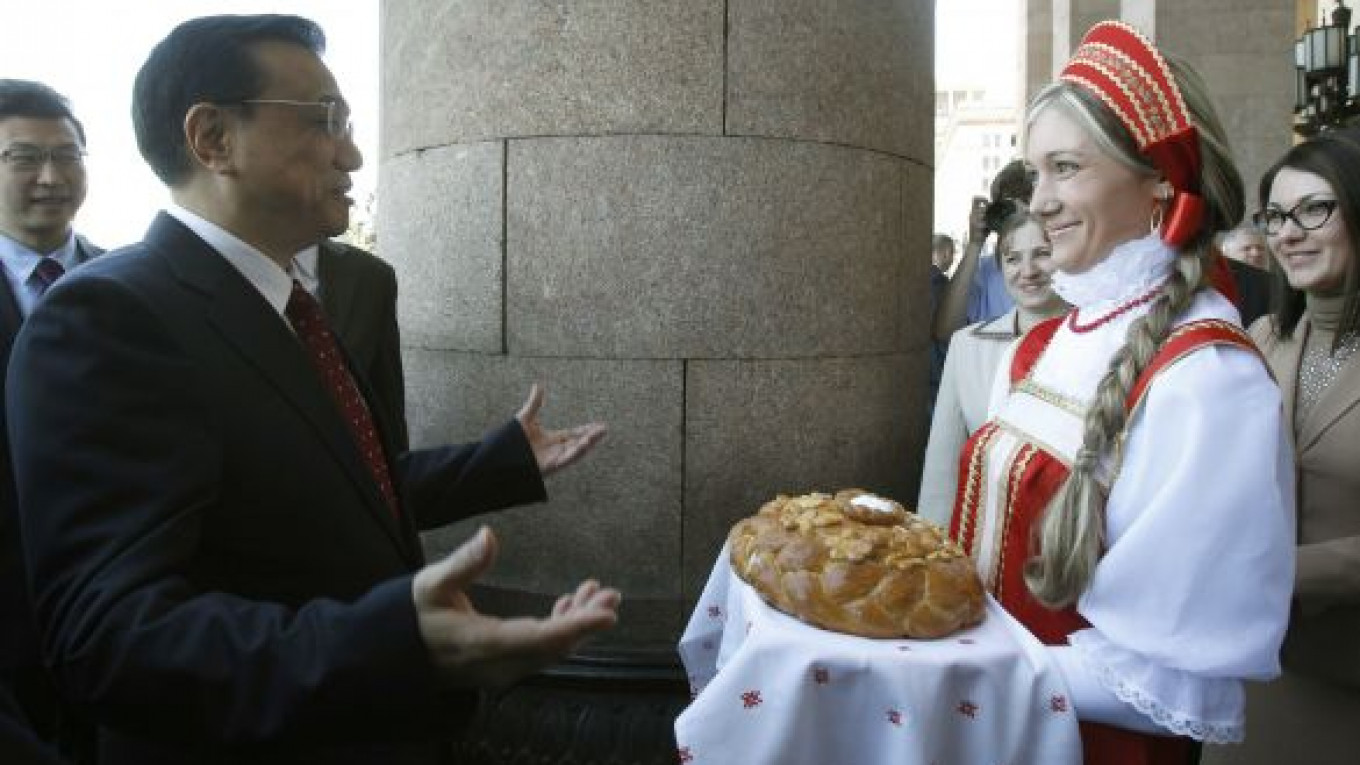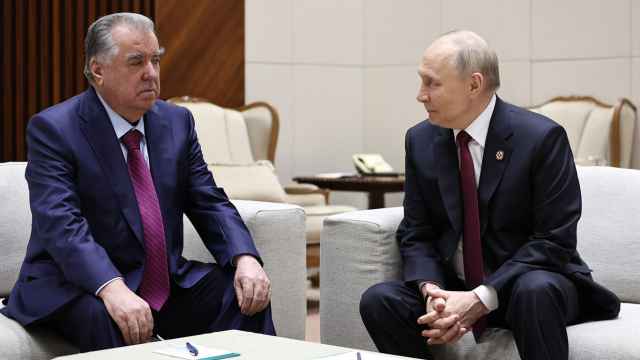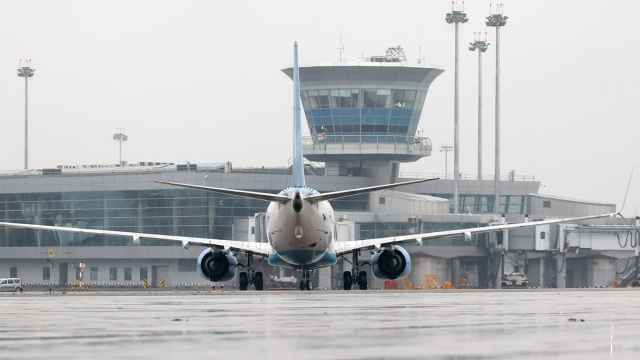Chinese energy officials signaled Saturday that they were keen to pursue a major gas deal with Russia despite a proliferation of alternative supplies and that they had made a new proposal to overcome a price deadlock.
Talks between China , the world's fastest-growing energy consumer, and Russia, the world's largest conventional gas producer, fell apart late last year when China, frustrated by years of stalemate over price, increased its supplies from rival producer Turkmenistan.
A senior energy official visiting Moscow as part of a delegation led by Chinese Vice Premier Li Keqiang, who is on track to succeed Premier Wen Jiabao, told reporters that China had proposed a new model for cooperation on gas during the visit.
"Now all that remains is the question of prices," said Liu Tienan, the head of China's National Energy Administration.
He said Li had presented "a completely new model of developing of cooperation … in the natural gas sphere and received a positive assessment from the Russian side."
"We are interested in the companies of our two countries beginning discussions and consultations on this issue under the new model of cooperation."
Earlier in the day, the chairman of China National Petroleum Corp., Jiang Jiemin, reiterated to an economic conference that most of the key points of a gas deal were agreed.
"We have signed a buy-sell agreement with Gazprom," Jiang said, singling out the deal among successful ventures, including a loans-for-oil deal, under which China receives 300,000 barrels per day via a dedicated pipeline, and joint oil exploration in Siberia.
Under the terms of the gas deal, which was nearly finalized last year, Russia would sell up to 68 billion cubic meters of pipeline gas per year to China, more gas than it ships to any single European customer.
The two countries had agreed on everything but price and appeared on the brink of a final agreement a year ago when Chinese President Hu Jintao was preparing to come to Russia for an annual investor showcase in St. Petersburg.
But Russia's gas export monopoly Gazprom refused to accommodate Chinese price demands, arguing that it could sell the same gas to Europe for a higher profit than the Chinese offer had implied.
Frustrated by the long-running standoff, China opted to buy extra gas from the former Soviet state of Turkmenistan and backed up its choice with a decision to build a pipeline to accommodate more Central Asian gas.
A Gazprom source said before the Chinese visit that talks had not progressed, nor had the company reduced its asking price for pipeline gas deliveries to China.
Analysts have said China could not afford to pay Russia's asking price without raising domestic rates and eroding its competitive advantage in manufacturing.
"As always in the course of big work, there are issues that require additional attention, but we have learned to do it the way close friends do," President-elect Vladimir Putin said Friday after Gazprom chief executive Alexei Miller met Jiang.
"We are looking for compromises and are finding them," Putin said at a meeting with Li, also attended by Russia's top energy official, Deputy Prime Minister Igor Sechin and Energy Minister Sergei Shmatko.
Russia's government — increasingly wary of Gazprom's dependence on pipelines that bind it to specific customers and particularly of increasingly competitive European markets — has meanwhile ordered Gazprom to build new coastal plants to liquefy gas for delivery by tanker.
But Russia's nascent LNG strategy may not yield substantial sales to China, because Russia's sources of gas, except the fields off the Pacific island of Sakhalin, are far from the potential sites of coastal LNG plants, far from Asian markets, or both, which could make them too costly to compete.
China is pursuing unconventional gas production at home and is confronted with a widening array of potential import options — from Central Asian pipe gas to the shale fields of the United States, whose gas could be liquefied for export.
Meanwhile, Deputy Prime Minister Igor Shuvalov announced progress on a joint investment fund with China at a meeting with Li on Saturday. The value of the fund is $4 billion, Shuvalov said, Interfax reported. The goal of the fund is to support investments in companies participating in joint development projects, he added.
Plans for the fund — a venture between sovereign wealth fund China Investment Corp. and a Russian state vehicle — were announced in October, and it is expecting to clinch its first deal in the summer.
"We see an opportunity to expand [the fund] because of other [investors around the world] exhibiting interest in participating," Kirill Dmitriyev, chief executive of the Russian Direct Investment Fund, or RDIF, said in an interview on Friday.
The fund plans to announce that the venture will finalize its "first closing" with $2 billion raised in June, Dmitriyev said. "In June we will form it, and then in July-August we will do the first deal."
RDIF is financing the fund with $1 billion, its Chinese counterpart is adding the same amount, and another $2 billion is expected from Chinese institutional investors.
The Russian Direct Investment Fund was created to give major foreign investors greater comfort in Russia's uncertain business environment and is investing with private equity, strategic investors and sovereign wealth funds.
"The pipeline of potential deals for this fund includes industries such as forestry, machinery [and] logistics," Dmitriyev said.
(Reuters, Interfax)
China and Russia agree entirely with each other's positions on the crisis in Syria and on North Korea's nuclear program, Chinese Vice Foreign Minister Cheng Guoping said Saturday in Moscow, Reuters reported.
"The sides hold 100 percent coinciding positions on the issues of North Korea and Syria ," Cheng, who was accompanying Vice Premier Li Keqiang on a visit to Russia , told reporters through an interpreter.
A Message from The Moscow Times:
Dear readers,
We are facing unprecedented challenges. Russia's Prosecutor General's Office has designated The Moscow Times as an "undesirable" organization, criminalizing our work and putting our staff at risk of prosecution. This follows our earlier unjust labeling as a "foreign agent."
These actions are direct attempts to silence independent journalism in Russia. The authorities claim our work "discredits the decisions of the Russian leadership." We see things differently: we strive to provide accurate, unbiased reporting on Russia.
We, the journalists of The Moscow Times, refuse to be silenced. But to continue our work, we need your help.
Your support, no matter how small, makes a world of difference. If you can, please support us monthly starting from just $2. It's quick to set up, and every contribution makes a significant impact.
By supporting The Moscow Times, you're defending open, independent journalism in the face of repression. Thank you for standing with us.
Remind me later.






